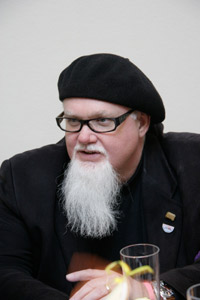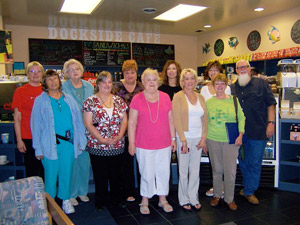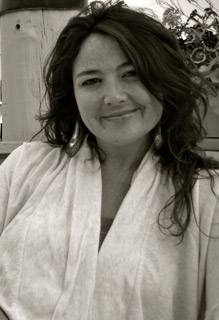The Raven
John Cusack plays Edgar Allan Poe in James McTeigue's fictionalized account of the author's pursuit of a serial killer whose murders mirror those in his stories. The movie is slated for release next March.
Jump to navigation Skip to content
John Cusack plays Edgar Allan Poe in James McTeigue's fictionalized account of the author's pursuit of a serial killer whose murders mirror those in his stories. The movie is slated for release next March.
The National Book Foundation (NBF) announced the National Book Award finalists today from Portland on Oregon Public Broadcasting.
The finalists in poetry are:
Nikky Finney for Head Off & Split (TriQuarterly Books/Northwestern University Press)
Yusef Komunyakaa for The Chameleon Couch (Farrar, Straus and Giroux)
Carl Phillips for Double Shadow (Farrar, Straus and Giroux)
Adrienne Rich for Tonight No Poetry Will Serve: Poems 2007–2010 (Norton)
Bruce Smith for Devotions (University of Chicago Press)
The finalists in fiction are:
Andrew Krivak for his debut novel, The Sojourn (Bellevue Literary Press)
Téa Obreht, who was honored by the NBF last year as a 5 Under 35 author, for her debut novel, The Tiger's Wife (Random House)
Julie Otsuka for her novel The Buddha in the Attic (Knopf)
Edith Pearlman for her story collection Binocular Vision (Lookout Books)
Jesmyn Ward for her novel Salvage the Bones (Bloomsbury)
This year saw the first graphic book finalist, in the nonfiction category: Lauren Redniss's Radioactive: Marie & Pierre Curie: A Tale of Love and Fallout (It Books). The nonfiction shortlist also includes biographies of Malcolm X and Karl and Jenny Marx, as well as Stephen Greenblatt's The Swerve (Norton), a look at Lucretius's philosophical poem, "On the Nature of Things."
The National Book Award winners will be announced on November 16 in New York City.
In the video below, Finney reads and discusses the story behind a poem from Head Off & Split.
Longtime P&W-supported sponsor and writer M. L. Liebler, author of fourteen books of poetry including The Moon A Box, which received the 2005 Patterson Poetry Award of Excellence, blogs about his monthly workshop at St. Clair Shores Library in St. Clair Shores, Michigan.
They all gathered, once again, as they have on the third Wednesday of the month for the past twenty-one years. Students, mothers, senior citizens, retired politicians, teachers, librarians, real estate agents, retired cops, and the occasional visitor who heard about us and wanted to “check us out.” Last night’s visitor was a fellow named Skippy, a retired Navy man from Connecticut who was so impressed with the quality of the work he heard and read that he politely asked if he could publish some of it in his church paper back home.
 I love these folks. I have met monthly with them as a small way of giving back to the community where I was raised and still proudly live. In fact, I live in the same house that my wife grew up in, and where I walked to every night while dating her when we were fifteen-year-olds.
I love these folks. I have met monthly with them as a small way of giving back to the community where I was raised and still proudly live. In fact, I live in the same house that my wife grew up in, and where I walked to every night while dating her when we were fifteen-year-olds.
Last night we heard and workshopped wonderful poems by the former County Commissioner who lamented the destruction of the ecology of America by contrasting it with the beauty of Spain’s wide-open spaces and well-kept urban areas. After this piece, a widow read her satirical poem about a suburban man who lives his life in a rush and doesn’t realize the beauty around him.
Another cool, outside the box, poem was a wonderfully rich work entitled "The Ascetic Life" by a retired librarian who explored the contemplative life of a “Holy Fool.” A young teenager read a poem that was written to get “something off [her] chest.” It was a poem about how her younger sister has continually belittled her and put her down her entire life. The poem was her empowering response that she “wasn’t going to take it anymore.” The poem received cheers from the seniors and an “I know exactly what you mean” acknowledgement from another teen in attendance.
 The evening concluded with another moving poem from one of our newer regulars, an eight-six-year-old widower who never wrote a poem in his life until he joined our group. He wrote about frequently waking up thinking there were “a lot of people in [his] house,” only to realize that he was alone.
The evening concluded with another moving poem from one of our newer regulars, an eight-six-year-old widower who never wrote a poem in his life until he joined our group. He wrote about frequently waking up thinking there were “a lot of people in [his] house,” only to realize that he was alone.
To quote Walt Whitman, “Have you ever felt so good to get at the heart of poem?” These people, young and old, are doing just that, and the great majority of them have never written a poem in their lives until now. I am grateful and honored to spend time with this diverse and welcoming group of poets. For me, this is where the real poetry in America lives!
Photos: (Top) M. L. Liebler. (Bottom) M. L. Liebler with workshop participants. Credit: Pamela Liebler.
Support for Readings/Workshops events in Detroit, is provided by an endowment established with generous contributions from the Poets & Writers Board of Directors and others. Additional support comes from the Friends of Poets & Writers.
Transform a poem that you've written or write a new poem without using the first person.
Instructor of applied theater at Cornish College of the Arts, Caroline Brown has facilitated workshops for diverse groups, including veterans, AIDS widows in Kenya, and incarcerated women, as well as P&W-supported writing/performance workshops with BABES Network-YWCA and Compass Housing Alliance in Seattle, Washington. Caroline shared some reflections on her work with us.
What makes your writing workshops unique?
For the most part, my focus has been on the use of theater and performance as a means of helping marginalized communities share their stories with a wider audience. Writing has inevitably been an integral part of this process. What techniques do you employ to help writers open up?
What techniques do you employ to help writers open up?
I conducted a five-week writing workshop with Seattle-based BABES Network-YWCA, an organization that supports women living with HIV/AIDS. I asked the women to help me create group guidelines for the duration of the process. One woman shouted “spelling doesn’t count!” I was so pleased to hear her say this, as I know were the rest of the women. This simple guideline gave the women permission to avoid self-editing, trust their instincts, and find their voices.
I offer exercises that reveal commonality and reduce feelings of isolation amongst the group. I do this by asking participants to create collective poems or short stories that reflect both the diversity and similarities of the group. While conducting the workshop with Compass Housing Alliance, an organization that provides services and housing to homeless and low-income people, we created a composite character that reflected each individual’s respective experience. The group chose a key turning point for the character and took turns answering questions as that character. They were able to collectively narrate the story of how he met his goals. I feel strongly that the participants would not have been as engaged had the same subject matter been discussed outside the context of a fictional story.
What are the benefits of writing workshops for underserved groups?
The work can be tiring and there are times when I yearn for a more conventional career. It is during moments of doubt that I remind myself of experiences such as the one I had working with incarcerated women in the Rhode Island state prison system. Upon completing a writing exercise one of the women asked me through tears if “we did these exercises on the outside.” She was being released from prison the next day and was scared of “going back to her old ways.” The workshops helped her to recognize herself as a good person, something she had never felt before. Her fear was that without such an outlet, she might forget this feeling and start making unhealthy decisions again. What stopped me in my tracks was the fact that such workshops are not so readily available to those who need them the most.
What effect has this work had on your life and/or your art?
I am inspired by the risks individuals take within the creative process and the freedom they gain from doing so. My greatest challenge in this work is to remember how important that journey is to everyone, including myself. After seven years of encouraging others to endure the challenges that come with the creative journey, it is important to remind myself to embark on the same. I owe it to myself as well as to those who have shown so much courage in the face of their own hesitations toward the creative process.
Photo: Caroline Brown. Credit: Sven McNichols.
Support for Readings/Workshops events in Seattle is provided by an endowment established with generous contributions from the Poets & Writers Board of Directors and others. Additional support comes from the Friends of Poets & Writers.
Directed by Alan Govenar, the new film The Beat Hotel explores the legacy of Allen Ginsberg, Peter Orlovsky, Gregory Corso, and other American Beats who took refuge in a cheap no-name hotel in Paris during the late fifties and early sixties.
The visionary cofounder of Apple died of complications from pancreatic cancer yesterday at the age of fifty-six. Here are some choice cuts from his commencement address at Stanford University in 2005, presented in the form of a poem.
Eighty-year-old Swedish poet Tomas Tranströmer was named winner of the Nobel Prize in Literature at an afternoon press conference in Sweden today.
"Because," says permanent secretary of the Swedish Academy Peter Englund, "through his condensed, translucent images, he gives us fresh access to reality."
Tranströmer, whose profession is psychology, investigates the "big questions," says Englund, such as death, history, memory, and nature, but in a way that does not belittle the human condition, but rather "makes us important."
Translated into sixty languages, Tranströmer's most recent collections published in the United States are The Great Enigma: New Collected Poems (New Directions, 2006) and The Half-Finished Heaven (Graywolf Press, 2001). U.K. publisher Bloodaxe Books released an updated volume of their 1997 translation, New Collected Poems in 2010.
The Nobel has not gone to an author from Sweden since 1974, when Swedish poet Harry Martinson and Swedish novelist Eyvind Johnson shared the award.
"So in the end you can't even really regret your misfortunes—because they led you somewhere," says Alice Walker in this retrospective video from Open Road Media, which recently released Walker's work, including The Color Purple, in digital form.
The Winter Anthology, a "collection of contemporary literature informed by history and older art, twenty-first-century science and philosophy, and the ending of print culture," is accepting entries for its 2011 contest.
All submissions will be considered for publication online and subsequently in Volume 2 of the anthology, alongside the poetry or prose of the winning writer, who will be awarded one thousand dollars.
This year's judge is poet Lisa Russ Spaar, a professor at University of Virginia whose poetry books include Glass Town (Red Hen Press, 1999), Blue Venus (Persea Books, 2004), Satin Cash (Persea Books, 2008), and the forthcoming Vanitas, Rough, which Persea will release next year. Spaar has also published essays in Shenandoah and Virginia Quarterly Review, and her poetry appeared in Volume 1 of the Winter Anthology, with poems by Lucie Brock-Broido, Jean Valentine, and Charles Wright and novel excerpts by Karl Ove Knausgaard and Magdalena Tulli.
Works of any genre are eligible for the contest. Each entry, which may range from two poems or a single essay or story to an entire book of up to fifty pages, must be accompanied by a ten dollar reading fee.
The address for print submissions and a link to the Winter Anthology's Submishmash entry page (which requires writers to submit an eleven dollar entry fee) are posted on the contest website. Entries must be submitted by November 15, and a winner will be announced in the winter.